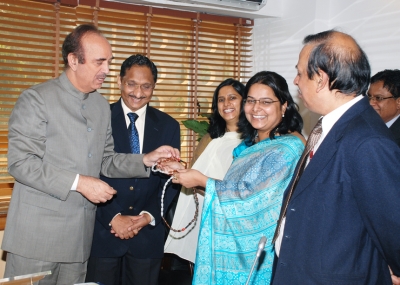Press release
05 Dec 2011
CYCLEBEADS – A SIMPLE METHOD TO CONTROL CONCEPTION (or PREGNANCY)
Novel contraceptive tool by HLL Lifecare
holds great potential for rural India
New Delhi, Dec 5: Count the beads, identify their colours and control your fertility.
CycleBeads, a simple, inexpensive, non-clinical and easy-to-use natural family planning method, could well be the answer to the problem of burgeoning population of India, the second-most populous nation that recently welcomed the footfall of world’s seven billionth baby on its soil.
Developed by researchers at Georgetown University’s Institute for Reproductive Health, Cyclebeads is based on the Standard Days Method (SDM) and is a very effective method for women to prevent unplanned pregnancies. This method is designed for women with cycles between 26 and 32 days.
Cyclebeads is a colour-coded string of beads that represents the days of a woman’s menstrual cycle. A woman simply moves a ring over the beads to track each day of her cycle. The colour of the beads lets her know whether she is on a day when she is fertile or not.
For using this technology, a woman has to put the rubber ring on the red bead on the day she starts her period. Each day she moves the ring one bead. While the ring is on a red or dark bead, there is little possibility of pregnancy and thus safe for intercourse. When the ring is on a white bead --- Days 8 through 19 – there is a high possibility of becoming pregnant, with unprotected intercourse.
Cycle Beads are manufactured and distributed in India by the government of India owned HLL Lifecare Ltd (HLL), the largest contraceptive manufacturer and leader in innovative family planning healthcare products through an agreement between HLL and Cycle Technologies (US), the original license.
“HLL has been doing the manufacturing operations for the product as per the specifications of Cycle Technologies and distributing the product to Institute of Reproductive Health (IRH) and HLFPPT (Hindustan Latex Family Planning Promotion Trust) under the brand names of ‘Mala Chakra’ and ‘Ritumala’ respectively,” says HLL Lifecare Chairman and Managing Director M. Ayyappan.
Union Health and Family Welfare Minister Ghulam Nabi Azad, who formally launched Cyclebeads at a function here recently, said: “Along with Hindi and English, we should introduce supporting literature for this product in Urdu so that Urdu-speaking people from rural areas also get benefit.”
As it is a natural method and does not have any side-effects, Cyclebeads` attracts newly married couples, who would otherwise choose not to use a family planning method because of perceived fear about its impact on fertility.
“Cyclebeads, based on the Standard Days Method, not only empowers women but also engages men in family planning. Engaging and sensitizing men about their role in family planning is a need also addressed by other methods such as vasectomy and condoms. Thus, the Cyclebeads method supports the government’s efforts to engage men vis-à-vis family planning,” says Mr. Ayyappan.
The state of Jharkhand has proactively taken this technology to various communities in the state and shown its commitment to expand contraceptive choice for population stabilization. “We laud the Jharkhand government for becoming the first state to introduce Standard Days Method and Cyclebeads to the remotest of villages through frontline workers. Kit is currently available in 12 of the state’s 24 districts,” the HLL chief says, adding: “The government’s focused efforts have resulted in more than 40,000 users in the state.”
With 95 per cent effectiveness, it is comparable to other modern user-directed contraceptive methods. Moreover, this is suited to Indian family planning needs as it is natural, simple, and easy to use method that does not require re-supplies, thereby improving access to family planning, observes Mr. Ayyappan.
“Also, it contributes to reduced burden on clinical providers by engaging ASHAs (Accredited Social Health Activists) in services, bridges gap in unmet need, attracts new family planning users and can be used by educated or illiterate women alike regardless of age, religion or rural/urban residence.”
India, with a high unmet need for family planning (as high as 14.1 per cent in rural areas) and low contraceptive use, will benefit enormously from inclusion of Cyclebeads, as it is designed to complement the government’s efforts at population control and stabilization.
“HLL is trying to expand its contraceptives portfolio by many such innovative products in the Indian context. Cyclebeads is a pilot social marketing project of HLL and its efforts towards making this innovative product more widely available is critical to the success of this method in India. We strongly believe that the product will actually complement the usage of condoms, by enabling partners to know their fertile period and take precaution, thereby.” says Mr Ayyappan.
Photo Caption: Hon’ble Union Minister for Health and Family Welfare Shri Ghulam Nabi Azad formally launching `Cyclebeads’ by giving `ritu mala’ to Ms Priya Jha of Institute for Reproductive Health, Georgetown University, in New Delhi recently. Union Health Secretary Shri P K Pradhan (right) and HLL CMD Shri M Ayyappan (centre) are also seen.




